Why S-REITs May Not Be Your Best Retirement Income Generator
If you have always believed that S-REITs are your best bet when it comes to real estate investing. Think again. Here’s an insight into how some REITs have been operating to the disadvantage of their unitholders, leading to share dilution and falling share prices, among others. Read more now.

Singapore Real Estate Investment Trusts (S-REITs) have long been a popular investment choice for investors looking to earn passive income during their retirement years.
This is unsurprising, as these investment vehicles have historically delivered fair dividend income averaging 6.4% in the 12 months leading to January 2022, according to Bloomberg and Singapore Exchange data*. To put things into perspective, that is more than twice the average dividend yield of 3% generated by the Straits Times Index over the same period*.
But before you start to think that healthy dividend yields would imply that S-REITs are an ideal investment for generating retirement income, you need to know that these investment vehicles could conduct active fundraising exercises through rights issues and preferential offerings, which could potentially impact your returns. And these are usually not accounted for in the dividend yield computations.
In addition, for some S-REITs, the total distributions paid out to their unitholders may be less than the total funds raised from them, even though positive dividend yields and total annual returns may have been reported.
All these would dilute the existing units of a REIT and potentially lead to a fall in its share price over time. These are some classic examples:
IREIT Global
A case in point of such an S-REIT would be Europe-focused IREIT Global, which has distributed a total of SGD239.3 million to unitholders*, since its Initial Public Offering (IPO) in 2014, where it had raised a total of SGD352 million from unitholders. Funds were also subsequently raised in 2015, 2020, and 2021 to finance the acquisition of portfolio assets and repayment of loans.
This means that investors who had bought into the three rights issues and preferential offerings would possibly have paid more cash for these new units than they had earned from the distributions.
IREIT Global may have generated an annualised total return of 5.9% since its listing, according to Bloomberg data*, but the share dilutions from fundraising and the impact of COVID-19 had caused its share price to slump some 23% since its IPO.
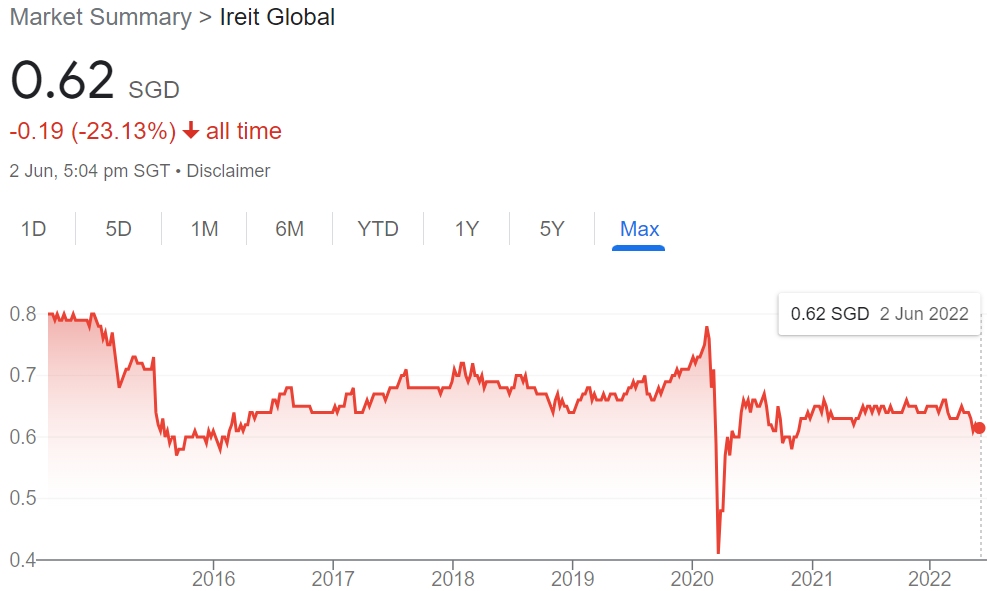
Keppel REIT
In its earlier days, Keppel REIT had also actively raised funds to expand its investment portfolio. It now ranks among the 10 largest REITs in Singapore, with a market capitalisation of SGD4.5 billion*.
While the REIT has paid total distributions of SGD2.21 billion to unitholders, it has also raised SGD2.16 billion from the unitholders in 2008, 2009, and 2011*.
Since its listing, the share price of the units had almost halved, declining by 48.7%. And according to Morningstar data, the return on equity for Keppel REIT is only 4.6%.
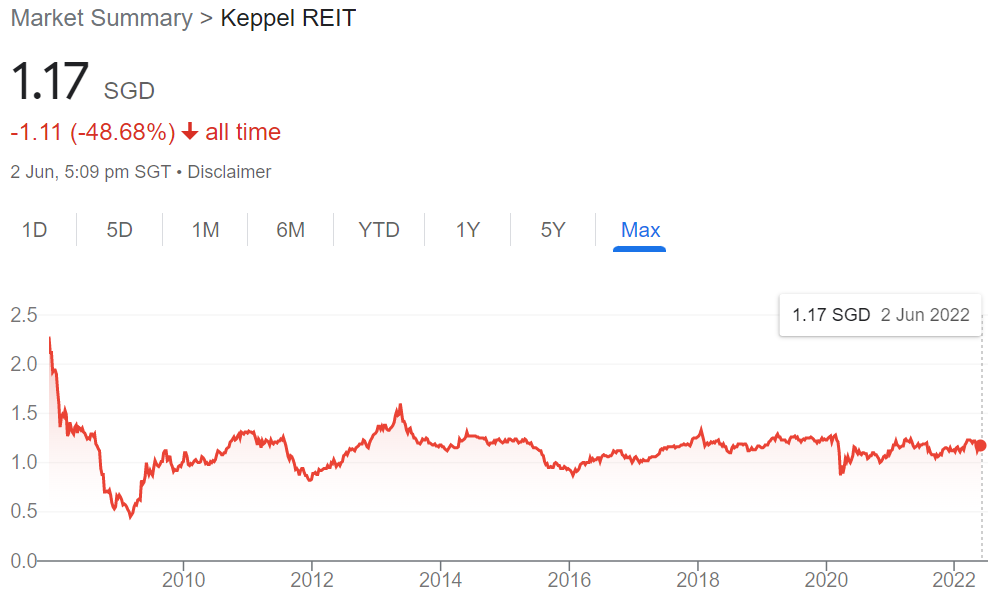
Manulife US REIT
Manulife US REIT has raised a total of USD468 million over three successive years between 2017 and 2019. Since its IPO in 2016, it has paid distributions amounting to USD372.9 million to its unitholders*.
The REIT has generated total returns of 23% since its IPO. This translates into an annualised total return of only 3.2% for the U.S. office-focused REIT since its listing, according to Bloomberg data*. And its share price has fallen 17.4% since inception.
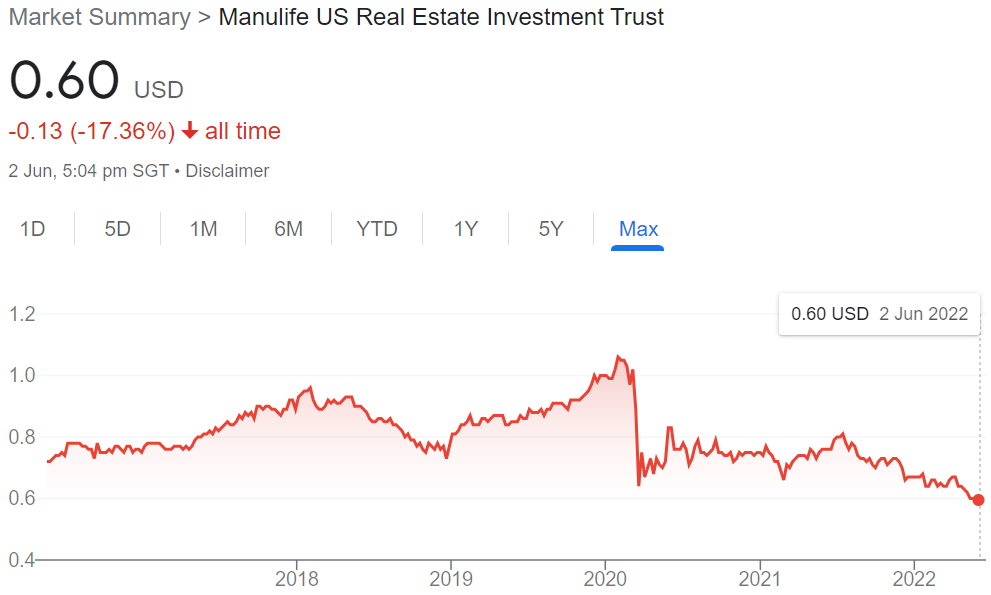
OUE Commercial REIT
OUE Commercial REIT, which debuted in 2014, had conducted two rights issues in 2015 and 2018, respectively, and had raised more than SGD806 million in funds. Distributions to unitholders had only amounted to SGD643.4 million, over the years.
The REIT has an annualised total return of a meagre 0.6% since its listing, according to Bloomberg data*. And so far, its share price has plunged by some 44%.
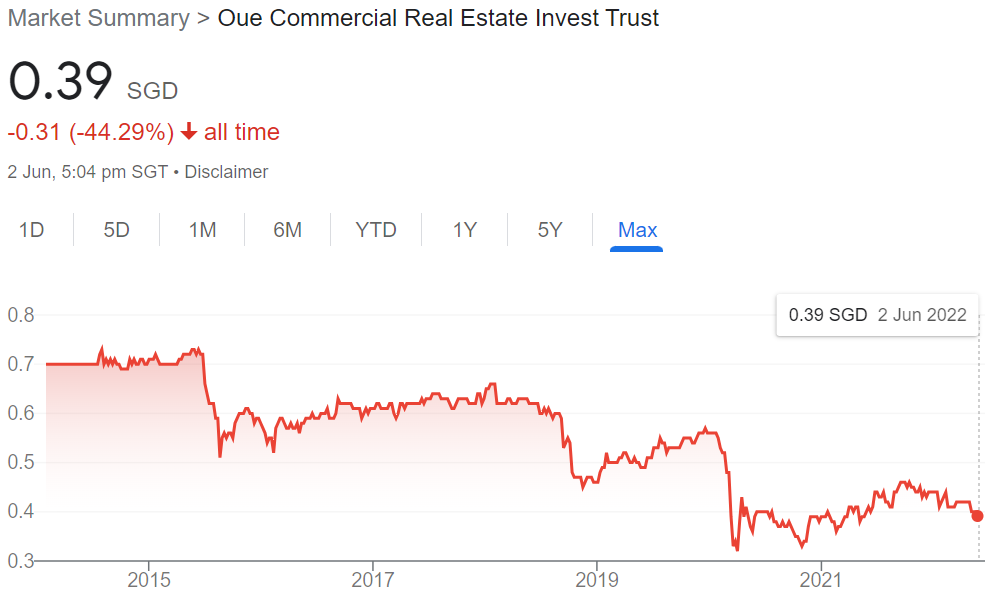
From these examples, the REITs’ dividend yields were almost always higher than the annualised returns, due to the poor performance of their share prices.
Legally, REITs are required to distribute 90% of their income as dividends, and the only way managers can continue to grow their investment portfolios would be to tap into funding sources, such as equity and debt. However, the dilutive effect of such new monies will mount constant downward pressures on their share prices over time, leading to declining share prices.
REITs are highly correlated with equities
From a portfolio diversification perspective, it is also important to consider the correlation of REITs with other asset classes, especially equities. From the asset class correlation map below, REITs have been highly correlated with equities at 0.60, and especially with the MSCI World Net TR Index (marked by ‘Global’ in the correlation map) at 0.67, and S&P 500 at 0.68. The higher the figure (the correlation coefficient), the higher the correlation between REITs with an asset.
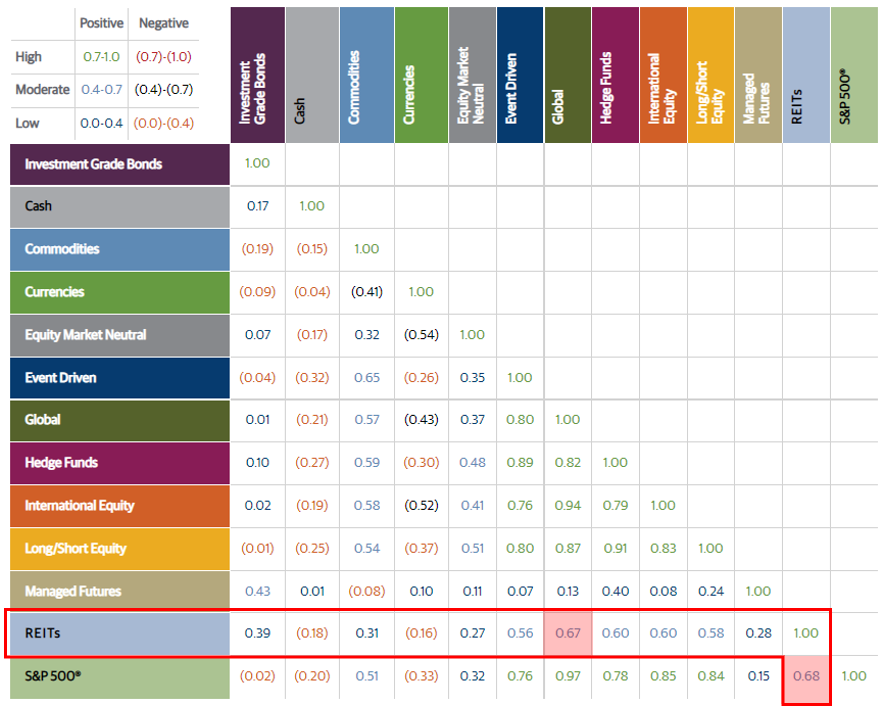
So, an investor with an investment portfolio that has a significant exposure to equity markets may want to think twice about allocating more to REITs. Being publicly traded, share prices of REITs can be strongly influenced by stock market conditions.
That also means that diversifying your real estate portfolio through REITs would expose you to stock market equities, compared to direct ownership of properties.
You can’t choose your preferred properties
It is also worth noting that you would not have the freedom to choose or manage the properties in your investment portfolio, when you invest in a REIT.
In some extreme cases, unethical REIT managers could spell the collapse of the asset, leading to huge financial losses. This was the case for Eagle Hospitality Trust (EHT), which was plagued with suspected breaches of disclosure requirements and fraudulent loans, which saw its directors arrested. EHT is now in the process of liquidating its various entities, and the REIT will most likely be delisted.
Take stock market volatility out of your real estate investments
Many investors are drawn to REITs because of the allure of high dividend yield. However, it is important to understand the risks and pitfalls within.
But the fact is, to gain hassle-free investment exposure to real estate, you may not always have to subject yourself to equity risks. One smarter option you could consider would be fractional ownership of physical properties.
An investment approach that is less affected by equity market volatility, fractional ownership of properties also allows you to diversify your property investments across geographies, property types, investment strategies, time horizons and amounts. And you will be able to choose to invest in the specific properties you prefer. All without having to worry about the hassle of overseeing property and asset management matters on your own.
So, consider gaining investment exposure to a diversified portfolio of real estate today, through fractional ownership of properties.
*Financial data and information herein are obtained from an article entitled “REIT distributions to fund your retirement may be less than what you anticipate”, The Business Times on 16 March 2022, written by Jude Chan. https://www.businesstimes.com.sg/companies-markets/reit-distributions-to-fund-your-retirement-may-be-less-than-what-you-anticipate
About RealVantage
RealVantage is a leading real estate co-investment platform, licensed and regulated by the Monetary Authority of Singapore (MAS), that allows our investors to diversify across markets, overseas properties, sectors and investment strategies.
The team at RealVantage are highly qualified professionals who brings about a multi-disciplinary vision and approach in their respective fields towards business development, management, and client satisfaction. The team is led by distinguished Board of Advisors and advisory committee who provide cross-functional and multi-disciplinary expertise to the RealVantage team ranging from real estate, corporate finance, technology, venture capital, and startups growth. The team's philosophy, core values, and technological edge help clients build a diversified and high-performing real estate investment portfolio.
Get in touch with RealVantage today to see how they can help you in your real estate investment journey.
Disclaimer: The information and/or documents contained in this article does not constitute financial advice and is meant for educational purposes. Please consult your financial advisor, accountant, and/or attorney before proceeding with any financial/real estate investments.
